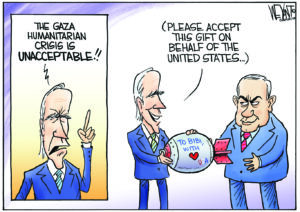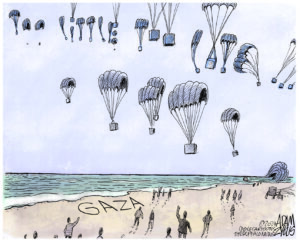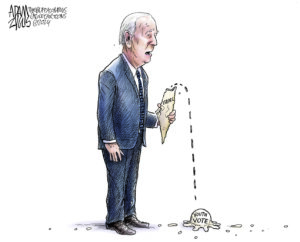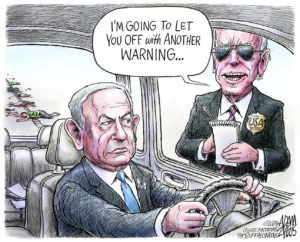Israeli Leader Hopes Summit Brings Arab Ties Out in the Open
At a conference in Poland, Prime Minister Benjamin Netanyahu aims to show off his country's improved relations with some Gulf Arab states.WARSAW, Poland — The Mideast conference in Poland that started Wednesday offers Israeli Prime Minister Benjamin Netanyahu an opportunity to flaunt in public what he has long boasted about happening behind the scenes — his country’s improved relations with some Gulf Arab nations.
Several Gulf dignitaries are expected to attend in a potential show of force against uninvited Iran. But the Palestinians are urging a boycott of the conference, and it remains to be seen whether Arab officials will make any public overtures to Netanyahu without a major concession to the Palestinian cause, which still animates the Arab public.
The United States and Poland are sponsoring the conference in Warsaw, which they say is aimed at promoting peace and security in Mideast but appears to be mainly focused on isolating Iran.
Iran has denounced the gathering as an American anti-Iran “circus.” Russia has said it will not attend, and the European Union’s foreign policy chief, Federica Mogherini, is also skipping the event.
For the Trump administration, it is a high-profile occasion to gather all its Middle East allies. For Poland, it offers a chance to strengthen ties with Washington as it seeks greater protection from Russia.
But the real winner could be Netanyahu, who has repeatedly stated that Israel has clandestinely developed good relations with several Arab states, despite a lack of official ties. Bringing such contacts out into the open would mark a major diplomatic coup, put a seal of approval on his goal of improving Israel’s standing in the world and provide a powerful photo-op for his re-election campaign ahead of the April vote in Israel.
Netanyahu’s office released a video Wednesday showing him meeting Oman’s foreign minister, Yusuf bin Alawi. Netanyahu, who visited Oman last October, called the invitation to the Gulf state “courageous” and said “many” countries are following Oman’s lead, hinting that additional meetings would take place during the conference.
Bin Alawi said people in the Middle East have “suffered a lot” because they stick to the past and said Wednesday’s meeting reflected a “new era.”
Before departing for Poland, Netanyahu told reporters on Tuesday the focus of the conference will be Iran, an issue he said “unites Israel, the United States, many countries in the world.”
Danny Danon, Israel’s U.N. ambassador, said his private contacts with Arab officials are far warmer than what is said in public.
“As of now, they are already cooperating with us,” he told reporters in Jerusalem recently. “We ask them to recognize us and not to be ashamed for using our technology or our defense systems.”
Israel has signed peace accords with Egypt and Jordan, but other Arab nations have refused to publicly improve relations without significant progress being made toward ending Israel’s half-century occupation of lands sought for a Palestinian state.
But as shared concerns about Iran have overshadowed the Palestinian issue in recent years, ties that have long lingered in the shadows have begun to emerge.
Days after Netanyahu’s visit to Oman, two of his Cabinet ministers headed to the United Arab Emirates last fall for a security conference and to cheer on an Israeli delegation at a judo tournament — where the Israeli anthem was played after an Israeli competitor won gold.
Saudi Arabia, long rumored to have backdoor ties to Israel, lifted a decades-long ban on the use of its airspace for flights to Israel last spring. The leaders of the small Gulf nation of Bahrain have also expressed willingness to normalize relations.
Gulf Arab states have given less voice to their traditional antipathy toward Israel as they have grown increasingly fearful of Iran over its involvement in various regional conflicts and its support for various armed groups. Getting closer to Israel also helps them to curry favor in Washington.
But with Arab public opinion still strongly against normalization with Israel, this week’s conference is unlikely to produce warm engagement right away, said Yoel Guzansky, a senior researcher at Israel’s Institute for National Security Studies.
“Covert meetings already exist, and the ‘under-the-table’ relations are the world’s worst kept secret, so I don’t see what the Arabs would gain from shaking hands,” he said. “The point is to see everyone in the same room as a united front against Iran. But the Arab street is still nowhere near where the elites are regarding Israel, and too strong an embrace could draw fire.”
The foreign ministers of Saudi Arabia and the UAE are scheduled to attend and meet with U.S. Secretary of State Mike Pompeo. It is unclear what their level of engagement will be with the Israeli delegation.
Netanyahu recently visited the Muslim-majority African nation of Chad to officially restore relations after 50 years and promised there would be more such visits and announcements soon.
President Donald Trump’s senior Mideast adviser, son-in-law Jared Kushner, has been working on an Israeli-Palestinian peace plan for close to two years, but has not yet released details. U.S. officials say Kushner is expected to make some comments in Warsaw about the conflict, but Netanyahu said he doesn’t expect any discussion of the peace plan.
The Palestinians have pre-emptively rejected the plan, accusing the Trump White House of being unfairly biased toward Israel. They’ve also asked Arab countries to boycott or downgrade their representation at the conference in Poland.
“We view the Warsaw conference as a plot against the Palestinian cause,” Palestinian Foreign Minister Riad Malki said this week.
Palestinian President Mahmoud Abbas met with Saudi King Salman on Tuesday, who expressed his “permanent stand” in favor of a Palestinian state with east Jerusalem as its capital, according to the official Saudi news agency.
Further tempering expectations, an Israeli TV channel obtained what it said was a secret Foreign Ministry report concluding it was very unlikely Saudi Arabia would normalize relations with Israel without a major concession to the Palestinians. The report, aired on Israel’s Channel 13 news, quotes a senior official as saying the narrow window for a breakthrough with the Saudis had closed.
Your support matters…Independent journalism is under threat and overshadowed by heavily funded mainstream media.
You can help level the playing field. Become a member.
Your tax-deductible contribution keeps us digging beneath the headlines to give you thought-provoking, investigative reporting and analysis that unearths what's really happening- without compromise.
Give today to support our courageous, independent journalists.






You need to be a supporter to comment.
There are currently no responses to this article.
Be the first to respond.